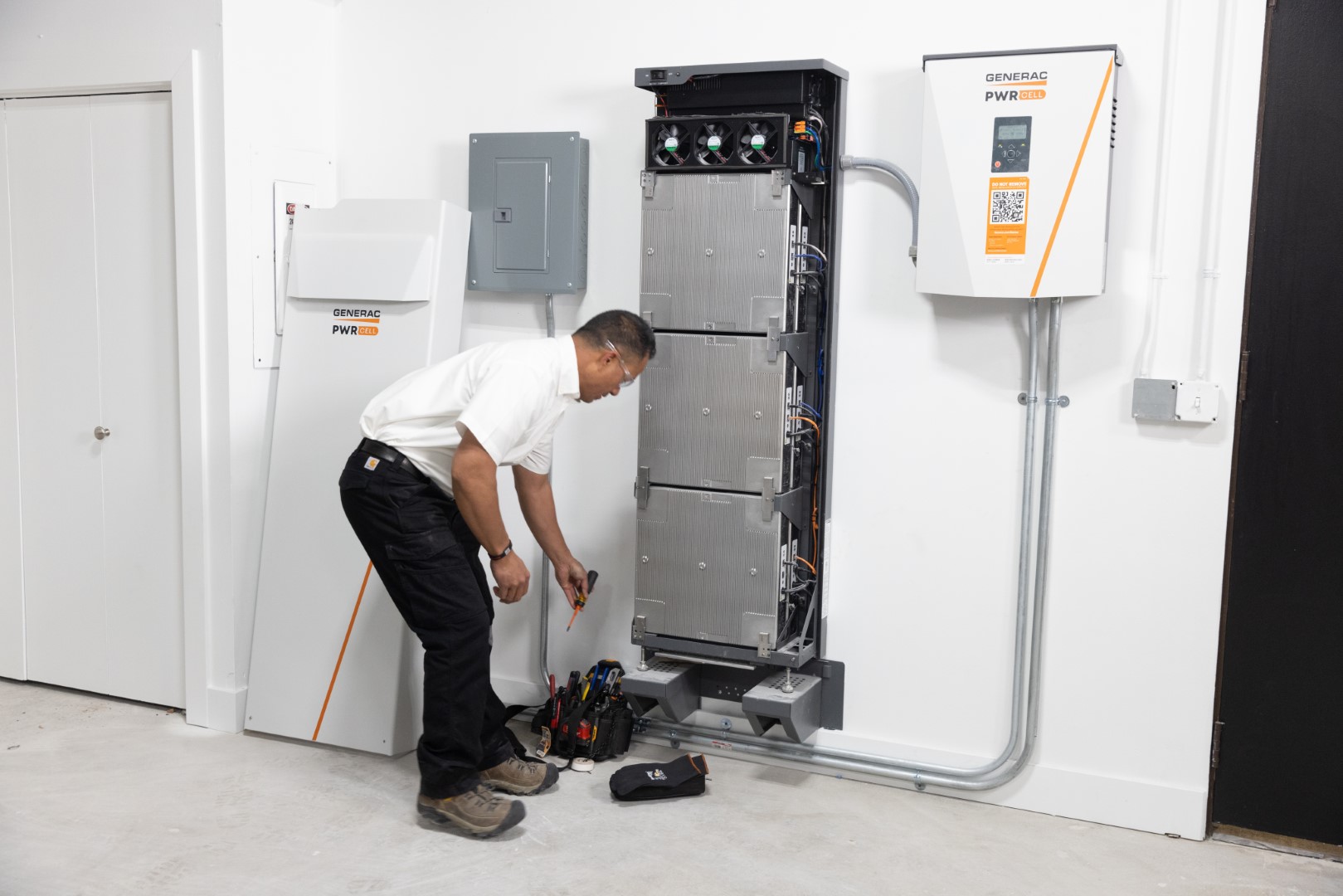Generator Repairs in Las Vegas, NV & Salt Lake City, UT

A generator comes in handy for an unexpected power outage. It provides electrical power for as long as needed to your home or building. Most generators end up unused for a while, but this doesn’t mean such generators can’t develop problems too.
Regardless of how often you’ve used your generator, it’s possible to have some unexpected issues. Here are some tips on generator repair for common generator problems.
- When my generator won’t start - Not been used for a long time can cause your generator to have a hard time starting. Any of the following could be the cause of the problem.
- Carburetor - The carburetor may become clogged from leaving the fuel in too long. If this is the situation, clean the carburetor with a carburetor cleaner or get a new one installed.
- Spark Plug - The spark plug could be worn out or damaged. This is often a common reason why your generator won’t start. Check and replace the spark plug if it shows these signs.
- Ignition coil - The ignition coil is the coil that transmits current to the plug from the running engine. Hence if this coil isn’t transmitting, your generator won’t start. Use a tester for ignition coils to check if it’s working and replace if it’s not. Be sure to also test the spark plug alongside.Other parts that may contribute to the generator not starting include the flywheel key, recoil starter, start switch, and safety switch.
- When my generator battery keeps dying - The voltage regulator in the generator transmits the voltage to the battery from the alternator to charge the battery. But, if the voltage regulator is faulty, the battery will not receive enough voltage, which will lead to the battery draining quickly. If your generator battery keeps dying, then it’s most likely a voltage regulator or alternator problem. Depending on which it is, you will need a replacement.
- When my generator won’t stay running - This can be frustrating, but it’s often between the fuel cap and carburetor. With a clogged carburetor, the generator won’t stay running. This clogging usually happens when fuel is left for a long time in the generator without use. Drain the old fuel and clean the carburetor to get the generator running again as normal. If this doesn’t work, check the second culprit. If the fuel cap is clogged, you will need a replacement.
- When my generator leaks gas - Gas leakage in generators is both common and easy to solve. Check these parts to see if they are missing or dried out – Carburetor Gasket/ Float Bowl Gasket/ Carburetor Bowl Gasket. A simple replacement will solve this.
Who should repair a generator?
While you can troubleshoot certain problems with the generator and get results, bear in mind that calling an electrician is best. It saves you guesswork, stress, and more money when a professional fixes the problem.
As a rule of thumb, run the generator from time to time; remove old fuel; check oil levels and spark plug regularly.
What Does It Cost To Repair A Generator?
So you finally got around to using your generator when the need arose. But you noticed there might be a problem with the generator. If you’re ever in this situation and your next thoughts are how much would it cost to repair a generator, we have the answers here.
A generator repair can cost less than you imagine or even more because the costs depend on certain factors.
Factors that determine a generator repair cost.
- Type of generators - The two main types of generators are portable and permanent generators. While portable generators run on fuel or gasoline and are moveable around the home, permanent generators run on fuel from a natural gas line or a propane tank. Permanent generators are permanently installed into the home’s mechanical system. When it comes to the cost of repairs, a portable generator is often cheaper.
- Generator size - Generator sizes are denoted in kilowatts and you can find various sizes from 7 kilowatts to 45 kilowatts. Large generators deliver 22-45 kilowatts of power and thus cost much more to repair and maintain than smaller generator sizes.
- The scope of the problem - There is a wide range of issues that could affect a generator regardless of its type. Each problem requires a specific approach that influences the cost. For example, electrical problems will require an electrician, replacing or changing parts will require purchasing new parts, and so on.
When evaluating whether your generator needs a repair, keep in mind that a portable generator can cost between $395 and $10,000, while a stationary one goes roughly between $4999 and $10,000.
- General generator repairs can cost $60 – $600.
- Repairs involving a generator that won’t start can cost $60 – $135.
- If you would need to install a new battery/oil/air filters, the costs are around $50 – $62
- Replacing a new carburetor is usually around $120.
- A generator technician’s labor cost is usually around $55- $75 per hour.
- If there are electrical problems, an electrician might charge between $40 and $105 per hour.
All electrical contracting companies are different with their pricing. Reach out to find out more.
What to do before calling a generator repairer
It’s possible to be able to give your generator a quick fix if that is all it requires to run properly again. This can save you the repair costs and time. Here are a few steps you can take:
Try troubleshooting the generator. Check that the generator’s power cord is properly plugged into the home’s electrical system and is not damaged. Check for fuel content in the generator. Confirm the home’s electrical connections is not the problem.
If after troubleshooting with basic steps the generator’s problem persists, then it’s time to call the Yes! electricians at 844-216-9300.
Repair VS Replace
A generator is a significant investment you make to give your home or business a plan B for power supply. They come in handy if there is a sudden power outage or you just need that source of electricity to power your home or business at a particular time.
Imagine how confusing it can be when you have to choose between repairing your generator and replacing it.
Generator issues are almost inevitable either due to age or other faults. We will discuss below what the better choice could be between a generator repair and replacement.
Start by considering the following:
Is my generator still reliable?
The generator is supposed to be your backup power source, but if you can’t trust it to be up and running for you when you need it, then it’s probably time to consider a replacement. An unreliable generator gives various problems starting up. And when it starts, it doesn’t work as it should.
Can you always find the parts and services?
Maybe it has been a few years since you’ve had your generator. The model might be outdated and its parts out of the market. It’s no use to keep a generator whose parts are hard to find as well as a mechanic with the right skills to work on it.
Could you benefit from modern or the latest technology?
Things change every day and a faulty generator could be your chance to replace it with a modern model. These latest generators come with new features and benefits such as quieter operation, less vibration, fuel economy, greener efficiency, and small and lighter sizes.
What’s in it for you in the long term?
Most times a generator repair can cost far less than purchasing a new one but this is often only a short-term benefit. If your generator is aging and needing repairs more frequently then replacing it will be beneficial in the long run. You also have to consider how the old generator fits into your future plans a few years from now.
Can you cope with its fuel consumption?
If you notice that your fuel costs are steadily rising, or your fuel tank only lasts for a while, it could be an indication that your generator’s performance is not at its optimal level. Once the performance is comprised, you might end up spending more to operate it than replacing it. If you note a difference, look for a professional for a recommendation.
Is there carbon monoxide emission?
If your carbon monoxide detector picks up some emissions, you should examine your generator. When generators start to fail, it is common to produce carbon monoxide emissions. Therefore, you should stop using the generator and replace it as soon as possible. Carbon monoxide can cause health and safety problems.
Making the right decision
If the pros of getting a new generator outweigh those of keeping the old and faulty one, then you should look towards buying a new generator.
Enlist the help of a professional technician in buying one that serves your needs now and in the long term. You can contact the experts at Yes! and call 844-216-9300 today!
